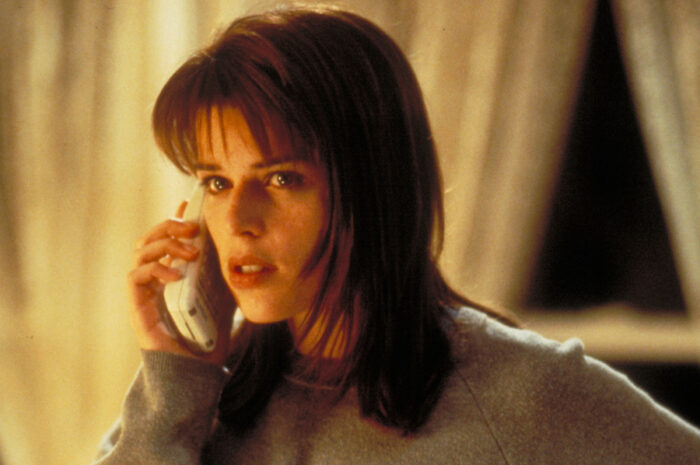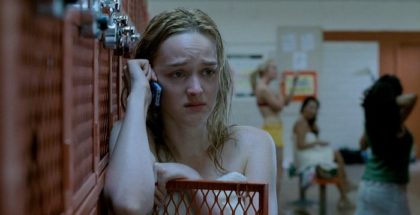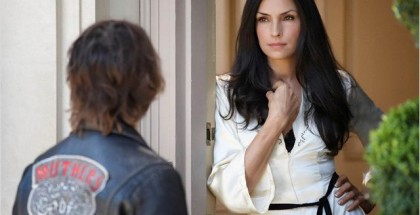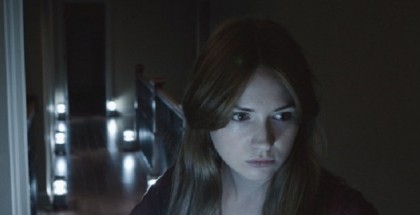Scream: Looking back at the self-aware masterpiece

Review Overview
Smarts
10Satire
10Scares
10Rating
David Farnor | On 10, Jan 2022
Director: Wes Craven
Cast: Courteney Cox, David Arquette, Matthew Lillard, Wes Craven, Rose McGowan, Drew Barrymore, Neve Campbell, Skeet Ulrich
Certificate: 18
Do you like scary movies? That’s the menacing question asked down the phone early on in Scream, Wes Craven’s satirical 1996 horror. It sets the tone for a slasher film that, at the time, felt uniquely self-aware.
Directed by horror king Wes Craven, the film originated from the brain of Kevin Williamson, who took the familiar horror movie premise of a serial killer stalking a group of high school students and turned it into a twisted post-modern response to the genre. Populated by teens who had grown up with Halloween and A Nightmare on Elm Street at the other end of their VCR remotes, each character we meet is armed with some kind of idea of what one should do when being pursued by a masked killer – knowledge that’s based entirely on their perception of slasher flicks.
Sydney Prescott (Neve Campbell) swiftly marks herself out as the final girl to root for, as she observes that she doesn’t watch horror movies because the girls who are usually killed in them foolishly run up the stairs when they should go out the front door. The fact that we’ve just watched another teenage girl do exactly that only reinforces the point. Such self-reflexive flourishes are par for the course in Williamson’s script, which has such memorably wry moments as film geek Randy (Jamie Kennedy) reciting the rules of horror movies while characters unwittingly break them (“I’ll be right back…”) – all while they gather at a climactic house party, because it has to climax with a house party.
Even the casting of the characters is playful, from Courtney Cox’s against-type hard-nosed reporter to Skeet Ulrich as sinister boyfriend Billy Loomis (fresh from starring opposite Campbell in The Craft), not to mention Matthew Lillard’s comic timing as perma-grinning Stu and the smart use of Drew Barrymore in the opening act. David Arquette (who was originally in the frame for Billy’s role) steals the show as deputy sheriff Dwight Dewey, playing what would have been the part of a tough lawman with a soft, goofy warmth that taps perfectly into the film’s sense of humour.
But what’s superb about Scream is the way that it manages not just to make wry observations and toy with our expectations but also sincerely follow the formula at the same time – Craven, who gave us Freddie Krueger, delivers some equally nightmarish set pieces here, from the Steadicam shots weaving through each empty house to the inventive use of phone calls and front doors that would usually be lifelines to freedom. And, throughout, characters keep popping up in the wrong place like red herrings in an Agatha Christie spoof, so that it’s possible to watch the whole thing as a post-modern whodunnit.
All these elements shouldn’t go together, but thanks to Craven’s deft ability to balance tone – helped by Marco Beltrami’s score, Williamson’s intelligent plotting and Campbell’s grounding central presence – what emerges is an unlikely success story. Capable of being funny as well as genuinely terrifying, it’s no wonder that it went on to become one of the highest-grossing slasher films of all time and has influenced no end of other films trying to do the same thing. That one of them – Scary Movie – should take Scream’s original working title and fail to pull off the same magic trick is testament to just how well done it is. It’s a scary movie for people who like scary movies – and, just maybe, for those who don’t like them too.


















